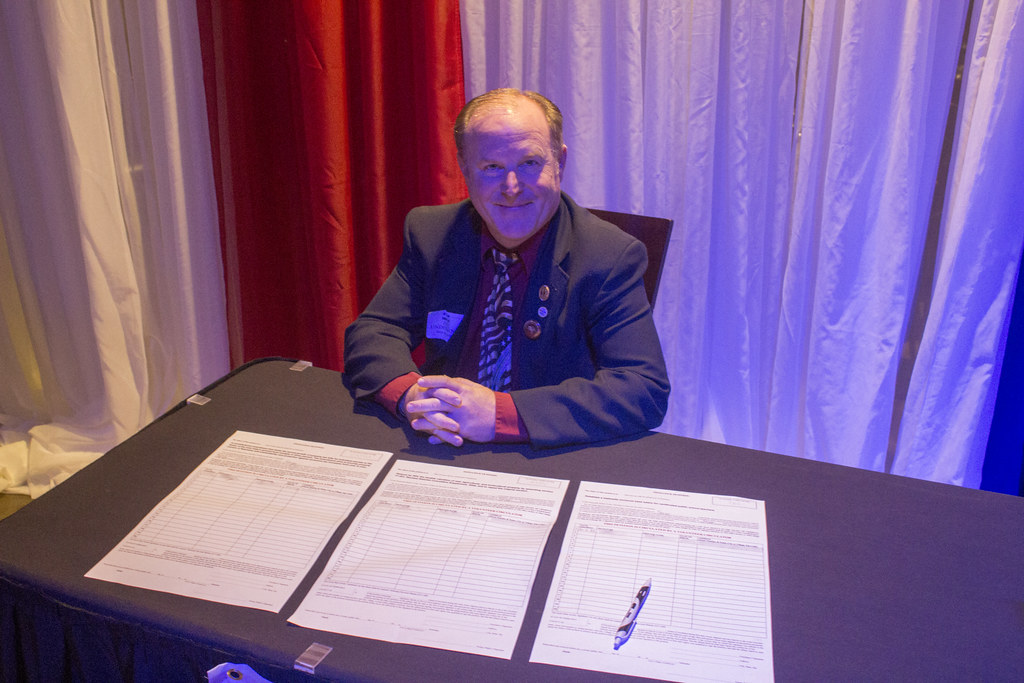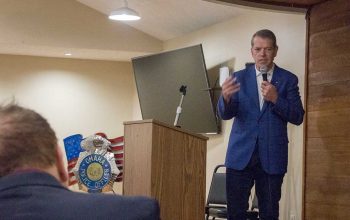Nebraska property taxes continue to climb year after year with no end in sight. According to data from the Tax Foundation, Nebraska now ranks fourth in the nation in effective property tax rate on owner-occupied housing (behind Illinois, New Jersey, and Connecticut). This comes in spite of some municipalities lowering their tax levies to counteract skyrocketing home valuations.
“Every year I get my property tax bill. And after I look at it, I get out my calculator and see what the increased percentage is. The last four years: 12%, 18%, 12% again, 21%. But the local municipality brags that they lowered our levy,” said Steve Sunde, Papillion city council member, at a Sarpy GOP meeting on Thursday. “How are your kids and my kids going to afford to buy a home? They can’t. That’s a big problem. We hear about affordable housing. It’s a huge problem for this generation coming up.”
Even with the modest Property Tax Relief Credits passed in a special session last year (via LB 34), Nebraska homeowners continue to pay more out of pocket. With no other major pushback coming from Nebraska’s unicameral, the state’s “second house” — the people — is now gearing up to take action via ballot initiatives.
The EPIC Option
The first option under consideration is the EPIC Option. In 2024, a version of this initiative was pitched as a state-level version of the “FairTax” proposal, replacing Nebraska’s property, income, inheritance, and corporate taxes with a single consumption tax. That effort fell short of qualifying for the ballot.
This time, for the 2026 ballot, the concept has been simplified into “EPIC Option 2.0.” At a recent Pachyderm Luncheon, Rob Rorhbaugh, a co-sponsor of the amendment explained, “It simply says you can’t tax real or personal property, you can’t tax a corporate or personal income, and you can’t tax inheritance. Other than that, have at it. Figure it out. That’s what we pay those big bucks for.”
While the concept is simple, implementing such a proposal may not be. Nebraska’s local governments rely heavily on property tax revenue, which constitute roughly 36% of local budgets. One concern voiced by Republicans, such as state senator Rick Holdcroft (LD-36), is that EPIC would eliminate local control.
“You no longer will have county commissioners or school board members or city council members who will listen to what you want and where you want to spend your money,” Holdcroft said at Thursday’s Sarpy GOP meeting. “We will decide in Lincoln how much money we’re going to give you for your schools, for your roads, for anything that you want, and I guarantee you it will not be as much as you want.”
Local control, however, often seems more performative than substantive. Under Nebraska’s Truth in Taxation law, public hearings must be held whenever a political subdivision proposes to increase its property tax request above the prior year’s level.
This year’s hearing in Sarpy County drew a smaller crowd than last year’s, and one guest told me the public had learned their complaints fall on deaf ears. It’s not uncommon for county or school boards to finalize their budgets before hearing a word of public input.
The APPLE Plan
While EPIC may appear to be a “nuclear option” on property taxes, more modest ballot efforts are already circulating under the banner of the APPLE plan (Assist Property Payers through Legislative Education Support), led by Eric Underwood and others.

One of these would cut the taxable portion of residential and agricultural property by 50%, effectively returning the taxed amount to levels seen about a decade ago. Local taxing authorities, such as schools and counties, would still retain the ability to raise the levy, if needed.
A second initiative would cap the annual growth in a home’s “taxable appraised value” to 3%. This is similar to a bill (LB 424) introduced by state senator Bob Andersen (LD-49) in the last session, which did not make it out of committee. Neither measure would affect the market value of a home or how much a homeowner could sell it for — only the portion subject to taxation.
Can APPLE end TEEOSA?
In addition to property tax changes, the APPLE plan proposes an initiative to mandate a baseline public school teacher salary of $50,000. In doing so, it would eliminate the TEEOSA formula, which currently governs Nebraska’s K-12 school funding.
TEEOSA was designed to reduce disparities in educational funding by providing “equalization aid” to districts with limited local tax capacity, shifting more responsibility to the state. It currently redistributes around $1.2 billion annually across Nebraska’s 245 school districts, though only about 50 to 60 receive “equalization aid” in a given year.
The formula is famously complex, having been tweaked many times since its 1990 inception. Superintendents and lawmakers sometimes require specialized briefings just to decode its mechanics.
“I don’t know if you ever looked at TEEOSA. It is ungodly complicated,” said Bob Andersen at a Sarpy GOP meeting in July. “I got a briefing after I was elected. Two hours on TEEOSA, and I’ll tell you what, I was dumber when I came out than than when I came in.”
Under the APPLE plan, TEEOSA would be scrapped. Instead, certified public school teachers in Nebraska would be guaranteed a $50,000 baseline salary (adjusted biennially), funded via state-administered quarterly block grants to school districts. The idea is to reduce the unpredictability of TEEOSA aid, stabilize local school budgeting, and give local boards flexibility in allocating remaining dollars.
“By providing a predictable, stable funding stream for teachers’ salaries through a block grant to your local schools, we empower our educators and remove the financial uncertainty that has challenged our schools,” said Kirk Penner of the State Board of Education at a press event Oct. 6 announcing the petition.
Is Relief on the Way?
Unlike EPIC, the APPLE-related amendments are proposed as statutory changes, not constitutional ones. Thus, they would only need 7% of registered voters (roughly 88,000 signatures) to qualify for the ballot.
Getting any measure on the ballot often costs millions of dollars, much of it for paid circulators, frequently from outside Nebraska. At present, these efforts lack the deep pockets needed to mount a serious challenge to Nebraska’s tax structure.
However, with the biting frustration from the pink “Truth in Taxation” postcards still fresh in the public mind — and likely worsening next year — there may be enough momentum for voters to say “enough is enough.”




